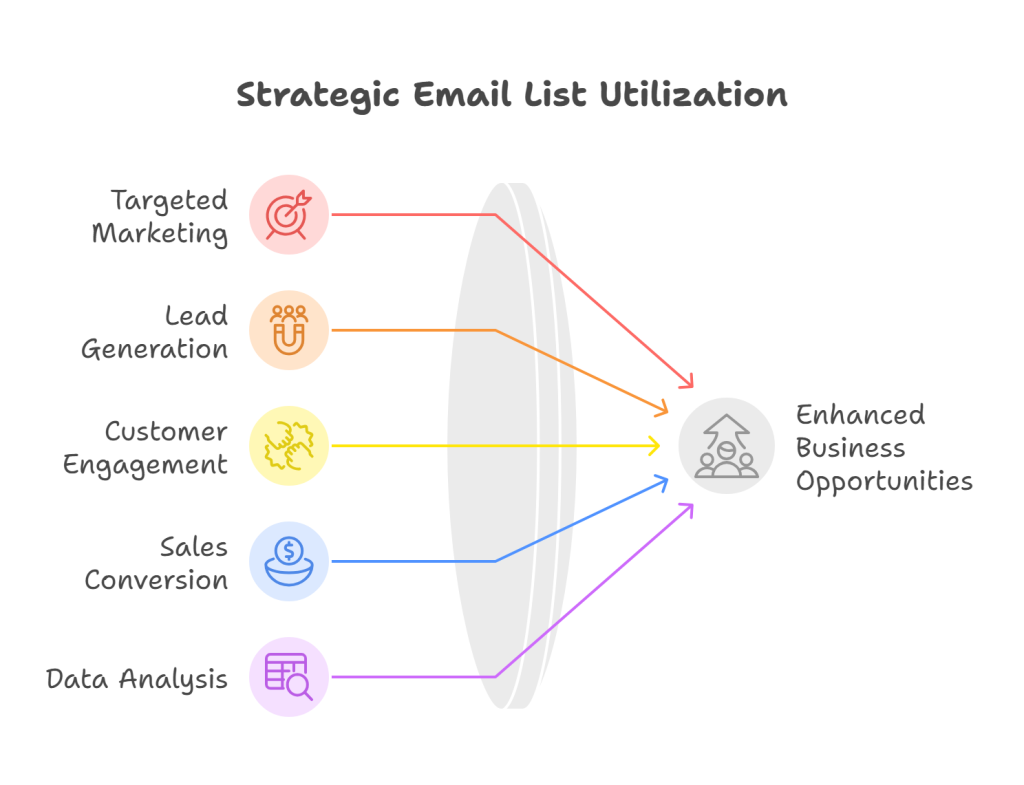Are you grappling with the challenge of converting more leads into loyal customers, or keeping your existing client base engaged and coming back for more? Many businesses, despite investing in robust CRM platforms like NetSuite, often find themselves missing out on significant opportunities.
They possess a treasure trove of valuable customer data within their NetSuite CRM but aren’t fully leveraging its potential for impactful email marketing.
The reality is, your NetSuite CRM isn’t just a record-keeping system; it’s a dynamic repository of insights waiting to be activated. This article will explore five actionable strategies to harness your NetSuite CRM email lists, transforming them from simple contact repositories into powerful engines for enhancing business opportunities, driving sales, and fostering lasting customer relationships.

By the end, you’ll understand practical steps to optimize your CRM email marketing efforts, empowering you to implement at least one of these growth-focused strategies immediately.
The Untapped Potential of Your NetSuite CRM Data
Your NetSuite CRM holds the key to understanding your customers on a profound level. It goes beyond basic contact management, serving as a central hub for comprehensive customer data – from purchase history and detailed interaction logs to expressed preferences and crucial demographic information.
This rich, interconnected data provides an unparalleled foundation for informing highly targeted and effective marketing efforts.
In today’s hyper-competitive digital landscape, the age of generic email blasts is rapidly fading. Simply sending the same message to everyone on your list is largely ineffective and often lands your communications directly in the spam folder. The real power lies in the shift from quantity to quality.
Your audience is bombarded with information, and only truly relevant and personalized communication stands a chance of capturing their attention and driving engagement. This is precisely where the deep insights within your NetSuite CRM become invaluable.
Read More: Improve Productivity & Growth With Bullhorn CRMS requirement
Read More: Benefits of Infor CRM software
5 Ways to Enhance Business Opportunities with NetSuite CRM Email Lists
1. Precision Segmentation for Targeted Campaigns
One of the most impactful ways to enhance business opportunities with your NetSuite CRM email lists is through precision segmentation. Rather than treating all contacts the same, segmentation allows you to group similar customers or leads and tailor your messaging accordingly.
A. Understanding Your Audience Segments: NetSuite’s robust reporting and saved search functionalities are your best friends here. You can easily create granular segments based on a multitude of criteria: their purchase history, the lead source that brought them in, their last interaction date, geographic location, industry, or even specific custom fields reflecting their interests.
For instance, you could segment customers who recently purchased Product A but haven’t yet explored Product B, creating a perfect cross-selling opportunity.
B. Crafting Segment-Specific Content: Once your segments are defined, the next step is to craft highly relevant content. This means tailoring your messaging, offers, and calls to action to resonate directly with each specific group. The difference in engagement is staggering.
For example, research indicates that segmented campaigns can see up to a 760% increase in email revenue compared to non-segmented campaigns. This data underscores the immense power of relevance.
2. Automating Email Nurturing Workflows
Once you’ve segmented your audience, the next step is to ensure consistent and timely communication. This is where sales automation NetSuite and marketing automation NetSuite capabilities come into play through automated email nurturing workflows.
A. The Power of Drip Campaigns: Drip campaigns involve setting up automated email sequences that are triggered by specific events or actions. These can guide leads through your sales funnel or keep existing customers engaged. Consider automated sequences for a new lead welcome, abandoned cart reminders, post-purchase follow-ups, or even re-engagement campaigns for inactive contacts.
B. NetSuite Workflows and Lead Nurturing: NetSuite’s powerful workflow engine allows you to configure automated email triggers based on specific criteria or actions. For instance, you can set up a workflow to automatically send a series of educational emails to a new lead once they reach a certain lead score, or after they submit a specific form on your website.
Imagine an automated series of emails for a new trial user, offering helpful tips and resources based on their initial engagement within the platform – all without manual intervention. This approach significantly boosts NetSuite lead generation efficiency.
3. Personalization at Scale
Beyond addressing someone by their first name, true personalization leverages the rich data you’ve collected. This strategy is critical for building stronger relationships and directly impacts customer retention NetSuite efforts.
A. Beyond “First Name”: Your NetSuite CRM holds much more than just names. You can leverage custom fields and historical data to achieve deeper personalization. This means referencing past purchases, acknowledging specific product interests, or even addressing industry-specific pain points directly in your email content. The goal is to make each recipient feel that the email was crafted just for them.
B. Dynamic Content and Custom Fields: NetSuite allows you to use custom fields to populate dynamic content in your email templates. This means different content blocks or offers can automatically appear based on individual customer data.
For example, an email could dynamically recommend products based on a customer’s previous browsing history on your e-commerce store, assuming it’s integrated with NetSuite. This level of personalized email campaigns fosters a sense of being understood and valued.
4. Leveraging NetSuite for Customer Retention & Upselling/Cross-selling
Customer retention NetSuite strategies are equally as important as new lead generation. Your existing customers represent a significant opportunity for continued revenue and growth, and NetSuite provides the insights to nurture these relationships.
A. Proactive Retention Strategies: NetSuite data can help you identify customers who might be at risk of churning. By tracking declining engagement, overdue payments, or a lack of recent activity, you can proactively send targeted retention offers or personalized check-ins. A simple, well-timed email expressing concern and offering support can make all the difference.
B. Identifying Upsell and Cross-sell Opportunities: The purchase history and product relationships within NetSuite are invaluable for identifying upselling and cross-selling opportunities. You can easily see which complementary products or higher-tier services would be relevant to your existing customer base.
For example, sending a special offer for an add-on module to customers who recently purchased a core software license can significantly enhance business opportunities by increasing customer lifetime value.
5. Tracking, Analyzing, and Optimizing for ROI
The final, and perhaps most critical, step in leveraging your NetSuite CRM email lists is to continuously measure and refine your efforts. This ensures you’re not just sending emails, but sending effective emails that drive measurable results and a strong ROI email marketing.
A. Key Email Marketing Metrics within NetSuite (or Integrated Tools): It’s essential to track key performance indicators (KPIs) such as open rates, click-through rates (CTR), conversion rates, and unsubscribe rates.
While NetSuite’s own NetSuite reporting can provide some insights, integrating with dedicated marketing automation tools can offer richer, more detailed analytics. Understanding these metrics helps you gauge the effectiveness of each campaign.
B. A/B Testing and Continuous Improvement: Email marketing is an iterative process. Always be testing! Experiment with different subject lines, calls-to-action (CTAs), and even content layouts. The data you gather from these tests will inform and refine your future campaigns, allowing you to continuously optimize for better engagement and higher conversion rates. This iterative approach is how successful CRM email marketing truly maximizes its return on investment.
Final thoughts
By implementing these five strategies – precision segmentation, automated nurturing, deep personalization, proactive retention, and rigorous analysis – you can dramatically transform how you utilize your NetSuite CRM email lists.
These aren’t just theoretical concepts; they are actionable steps that empower you to convert more leads, retain more customers, and ultimately enhance business opportunities across your organization. Your NetSuite CRM is a powerful tool; it’s time to unlock its full potential for strategic CRM email marketing.


